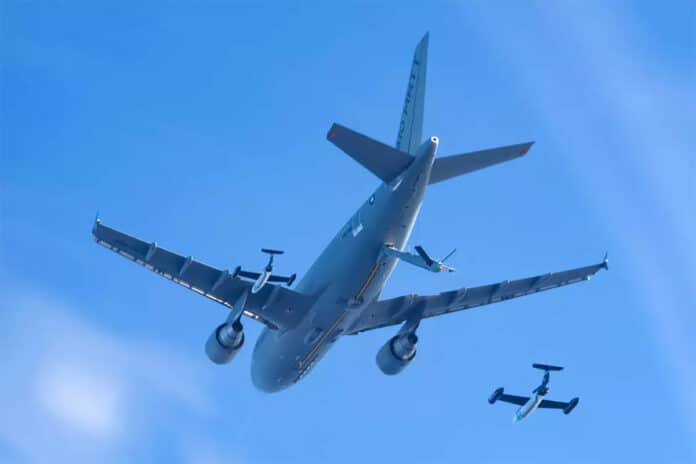Aerial refueling is an increasingly vital capability for military force projection, and Airbus has been developing technology to automate this process. Airbus-developed technology, called Auto’Mate, will allow for fully autonomous in-flight refueling and has the potential for wider applications in both defense and civil aviation sectors.
The development of Auto’Mate is a collaboration between Airbus Defence and Space and Airbus UpNext, the company’s innovation subsidiary. In addition to Auto’Mate, Airbus UpNext is also working on pilot assistance technologies, new propulsion systems, and sustainable aircraft design to further enhance flight safety and aircraft operational efficiency.
In March of last year, a significant milestone was achieved through a successful demonstration of the Auto’Mate system. The demonstration involved an Airbus testbed tanker aircraft and four unmanned drones, showcasing the autonomous in-flight refueling capability.
Now, the company has announced that it has completed the second round of testing in November 2023, where the Auto’Mate system demonstrated the potential of Autonomous Assets Air-to-Air Refuelling (A4R) operations. During this campaign, the system flew with five unmanned drones, including two digital twins of Airbus DT-25, under the control of an A310 MRTT tanker. The demonstration simulated a refueling operation utilizing advanced AI-based relative navigation and cooperative control technologies.
The use of autonomous technology in aerial refueling can enhance the safety, reliability, and efficiency of the process. By automating in-flight refueling without the need for human intervention, an aerial tanker can guide and control the “receiver” aircraft to the proper position to receive fuel, followed by the actual fuel transfer and a safe separation maneuver.
This eliminates the need for demanding and precise coordination between the aerial tanker’s crew and the pilot of the “receiver” aircraft. Additionally, autonomous technology allows for more effective operations and the ability to transfer fuel in low visibility conditions while also reducing training costs for flight crews.
Moreover, Auto’Mate technology paves the way for the refueling of non-piloted combat air vehicles such as drones, remote carriers, and “loyal wingman” operations, which are key unmanned elements of Europe’s Future Combat Air System (FCAS). This technology enables the whole refueling operation to be carried out seamlessly without the need for human intervention by the Aerial Refuelling Operator (ARO) on the tanker, the manned receiver’s pilot, or the unmanned drone’s operator. Ultimately, this could lead to autonomous tankers and aerial assets operating without a crew on board in the future.
In advancing autonomous in-flight refueling, Airbus is focusing on three primary key technological foundations: utilizing various cameras with varying resolutions and fields of view, high-precision satellite global positioning, and LiDAR sensors, all integrated with AI algorithms. Engineers are also concentrating on enhancing intra-flight communication networks and developing cooperative control and collision avoidance algorithms.
Airbus looks well set to take this next step in aerial refueling, building on its experience in the domain – beginning with its A310 MRTT (Multi Role Tanker Transport), which entered service in 2004 and followed by the new-generation A330 MRTT.
The A330 MRTT positions Airbus as a leader in the multi-role tanker transport sector, having already pioneered such advancements as the use of fly-by-wire control for the refueling probe and its development of a high-definition 2D/3D digital system for enhanced viewing by the fuelling operators,” Airbus said a statement.
Several countries, such as Australia, France, NATO, Saudi Arabia, Singapore, South Korea, the United Arab Emirates, and the United Kingdom have ordered a total of 60 A330 MRTTs. These aircraft have logged thousands of flight hours in support of military deployments and humanitarian operations.
